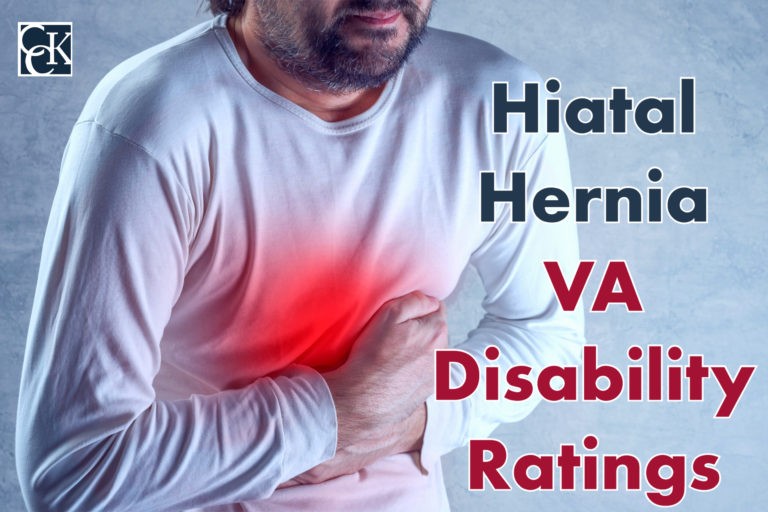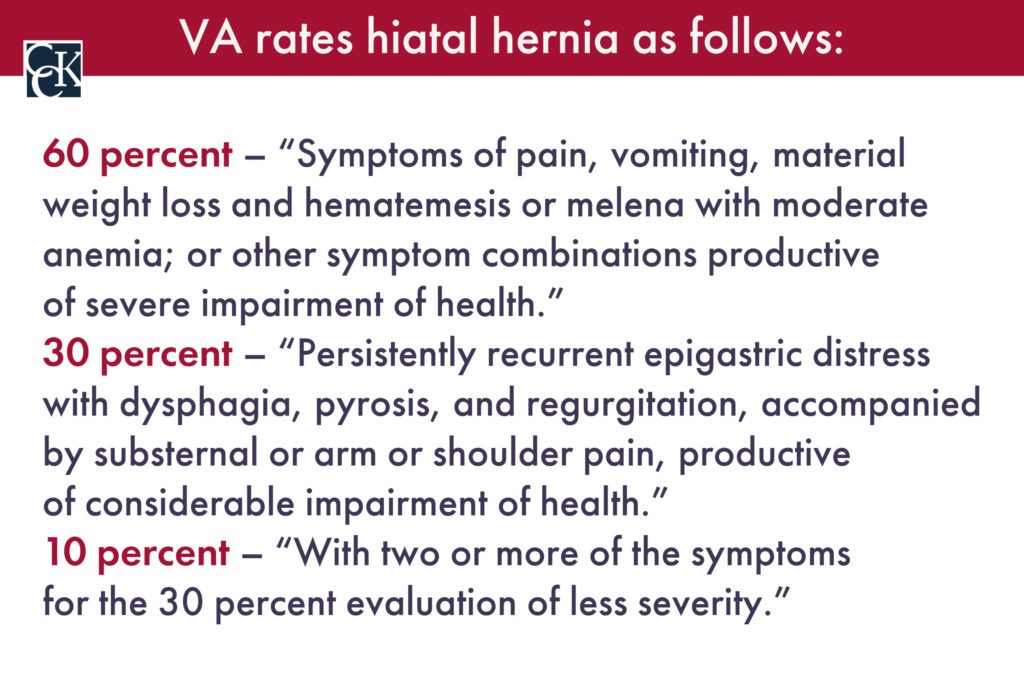Hiatal Hernia VA Disability Ratings

What Is a Hiatal Hernia?
A hiatal hernia occurs when the upper part of the stomach bulges through the large muscle which separates the abdomen and the chest. These hernias may force food and acid back into the esophagus, which can cause or exacerbate gastroesophageal reflux disease (GERD).
There are several types of hiatal hernias, including:
- Type I (Sliding Hernias) – Sliding hernias occur when the hiatal hernia involves the lower esophageal sphincter.
- Types II, III, IV (Paraoesophageal Hernias) – Paraoesophageal hernias are more severe cases of hiatal hernia, where the fundus (upper portion of the stomach) slides upward into the chest cavity through the hiatus.
In some rare cases, other structures (e.g., the small bowel or the colon) will move through the hiatus, in a condition known as giant esophageal hernia.
Symptoms of Hiatal Hernia
Small hiatal hernias usually do not cause any symptoms and therefore do not need treatment. Larger hiatal hernias, on the other hand, are associated with GERD. GERD, or gastroesophageal reflux disease, can damage the lining of the esophagus, leading to esophagitis or Barrett’s esophagus, so treatment is usually essential.
Symptoms of hiatal hernias can include:
- Heartburn
- Nausea
- Vomiting
- Wearing down of teeth
- Respiratory problems
- Difficulty swallowing
- Fatigue
- Shortness of breath
- A dry cough
More serious cases of hiatal hernias, such as giant hiatal hernia, may also cause anemia, aspiration, and more.
Diagnosing a Hiatal Hernia
Causes of this type of hernia are often unknown, although the condition can be developed due to an injury or a birth defect. Other risk factors include weakness in the muscles surrounding the hernia, obesity, and smoking.
Doctors usually diagnose hiatal hernia with either an upper GI series, also known as a barium contrast X-ray, or through an esophagoscopy of the esophagus. They are commonly diagnosed in people over age 50.
Treatments for Hiatal Hernia
Most hiatal hernias can be treated with medications and regular monitoring. If GERD worsens or other serious symptoms occur, surgical treatment may be necessary.
Minimally invasive hernia repair can reduce the size of a hernia and the opening in the diaphragm, preventing serious issues such as strangulation. Surgeons may also decide to perform a fundoplication, which creates a bulge of tissue to hold the stomach in place below the hiatus.

How to Get Service Connection for Hiatal Hernia
To qualify for U.S. Department of Veterans Affairs (VA) disability benefits, veterans typically need to provide proof of these three things:
- An in-service event, injury, or illness;
- A current diagnosis by a medical professional; and
- A medical nexus, or link, between the in-service event, injury, or illness and current diagnosis.
Veterans can submit a claim for VA disability compensation for hiatal hernia by filling out VA Form 21-52EZ. This form can be submitted via mail to VA’s Evidence Intake Center or electronically through VA’s website.
GERD Secondary to Hiatal Hernia
If a veteran develops gastroesophageal reflux disease (GERD) as the result of a service-connected hiatal hernia, they can file a claim for secondary service connection for GERD. To receive VA disability benefits for GERD secondary to a hiatal hernia, veterans must have:
- A current diagnosis of GERD by a medical professional; and
- A medical nexus connecting GERD to service-connected hiatal hernia.
Compensation and Pension (C&P) Exams for Hiatal Hernias
VA may also schedule a veteran for a compensation and pension (C&P) exam to evaluate their condition. C&P exams are performed by a VA physician or a VA-contracted physician, and usually have a dual purpose:
- To confirm or deny service connection for the veteran’s claim; and
- To assess the severity of the claimed condition so that a hiatal hernia VA rating may be issued if service connection is confirmed.
It is essential that veterans attend their C&P exams when VA schedules them. If a veteran does not attend a C&P exam, VA may deny their claim. If a veteran cannot attend an exam after it has been scheduled, the veteran should contact VA as soon as possible to reschedule.
In hiatal hernia cases, the veteran may want to consider using a Disability Benefits Questionnaire (DBQ). These forms are intended to quicken the claims process and give veterans the opportunity to answer questions about the symptoms, severity, and causes of their disability, as well as its relationship to other disabilities (e.g., secondary conditions). DBQs may also be filled out by a veteran’s primary care doctor prior to the exam.
It is important for veterans to be honest and thorough during their C&P exam and in their DBQ. Oftentimes, veterans will downplay the severity of their condition, which can be detrimental to their claim.

Hiatal Hernia VA Disability Ratings
Hiatal hernias are rated under the 38 CFR § 4.114, Schedule of Ratings – Digestive System, diagnostic code 7346. Veterans can be rated at 10, 30, or 60 percent, depending on the severity of their disability. The criteria for each VA rating are as follows:
- 60 percent – “Symptoms of pain, vomiting, material weight loss and hematemesis or melena with moderate anemia; or other symptom combinations productive of severe impairment of health.”
- 30 percent – “Persistently recurrent epigastric distress with dysphagia, pyrosis, and regurgitation, accompanied by substernal or arm or shoulder pain, productive of considerable impairment of health.”
- 10 percent – “With two or more of the symptoms for the 30 percent evaluation of less severity.”
Did VA Deny Your Hiatal Hernia Claim?
If VA denied your claim for hiatal hernia disability compensation, Chisholm Chisholm & Kilpatrick LTD may be able to help you appeal the decision. The experienced and skilled attorneys at CCK have helped many veterans win the VA compensation they deserve. Contact CCK today to schedule a free consultation.
About the Author
Share this Post
